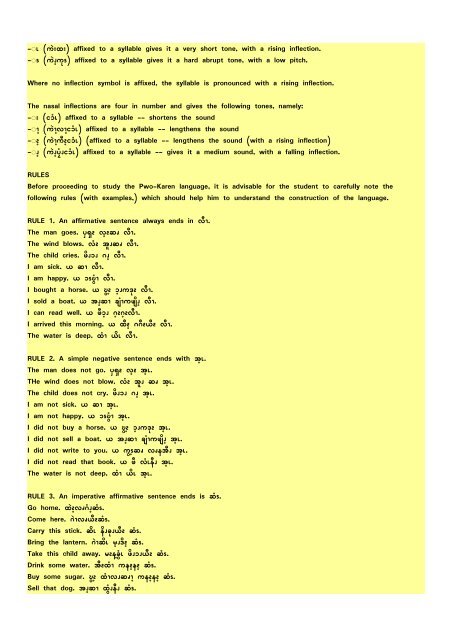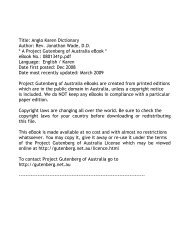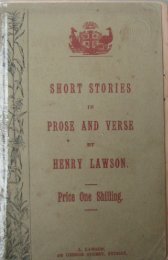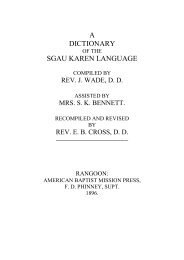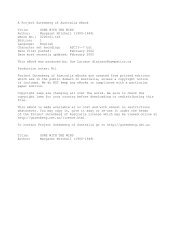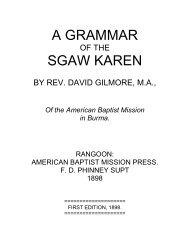A Manual of the Pwo Karen Dialect Author: Charles Harry Duffin * A ...
A Manual of the Pwo Karen Dialect Author: Charles Harry Duffin * A ...
A Manual of the Pwo Karen Dialect Author: Charles Harry Duffin * A ...
Create successful ePaper yourself
Turn your PDF publications into a flip-book with our unique Google optimized e-Paper software.
-ါၬ (ကဲးထး) affixed to a syllable gives it a very short tone, with a rising inflection.<br />
-ါၭ (ကဲၪ့ကု ၭ) affixed to a syllable gives it a hard abrupt tone, with a low pitch.<br />
Where no inflection symbol is affixed, <strong>the</strong> syllable is pronounced with a rising inflection.<br />
The nasal inflections are four in number and gives <strong>the</strong> following tones, namely:<br />
-ါး (ငၥံ ၬ) affixed to a syllable -- shortens <strong>the</strong> sound<br />
-ါၫ့ (ကဲၫ့လၫ့ငၥံ ၬ) affixed to a syllable -- leng<strong>the</strong>ns <strong>the</strong> sound<br />
-ါၩ့ (ကဲၫ့ကီၩ့ငၥံ ၬ) (affixed to a syllable -- leng<strong>the</strong>ns <strong>the</strong> sound (with a rising inflection)<br />
-ါၪ့ (ကဲၪ့ပၠ ံ ၪငၥံ ၬ) affixed to a syllable -- gives it a medium sound, with a falling inflection.<br />
RULES<br />
Before proceeding to study <strong>the</strong> <strong>Pwo</strong>-<strong>Karen</strong> language, it is advisable for <strong>the</strong> student to carefully note <strong>the</strong><br />
following rules (with examples,) which should help him to understand <strong>the</strong> construction <strong>of</strong> <strong>the</strong> language.<br />
RULE 1. An affirmative sentence always ends in လီၫ.<br />
The man goes. ၦၡၩ လ့ ၩဆၧ လီၫ.<br />
The wind blows. လံၩ အူၪဆၧ လီၫ.<br />
The child cries. ဖိၪၥၪ ဂၪ့ လီၫ.<br />
I am sick. ယ ဆၫ လီၫ.<br />
I am happy. ယ ၥၭဎွ ံ ၫ လီၫ.<br />
I bought a horse. ယ ဎွ ့ၩ ၥ့ ၪကဒု ၩ လီၫ.<br />
I sold a boat. ယ အၪ့ဆၫ ချံၫကဖျိၪ့ လီၫ.<br />
I can read well. ယ ဖီၥ့ ၪ ဂ့ ၩဂ့ ၩလီၫ.<br />
I arrived this morning. ယ ထီၩ့ ဂဂီၩယီၩ လီၫ.<br />
The water is deep. ထံၫ ယိၬ လီၫ.<br />
RULE 2. A simple negative sentence ends with အ့ ၬ.<br />
The man does not go. ၦၡၩ လ့ ၩ အ့ ၬ.<br />
THe wind does not blow. လံၩ အူၪ ဆၧ အ့ ၬ.<br />
The child does not cry. ဖိၪၥၪ ဂၪ့ အ့ ၬ.<br />
I am not sick. ယ ဆၫ အ့ ၬ.<br />
I am not happy. ယ ၥၭဎွ ံ ၫ အ့ ၬ.<br />
I did not buy a horse. ယ ဎွ ့ၩ ၥ့ ၪကဒု ၩ အ့ ၬ.<br />
I did not sell a boat. ယ အၪ့ဆၫ ချံၫကဖျိၪ့ အ့ ၬ.<br />
I did not write to you. ယ ကွ ့ၭဆၧ လၧနအီၪ အ့ ၬ.<br />
I did not read that book. ယ ဖီ လံၬနီၪ အ့ ၬ.<br />
The water is not deep. ထံၫ ယိၬ အ့ ၬ.<br />
RULE 3. An imperative affirmative sentence ends is ဆံ ၭ.<br />
Go home. ထဲၩ့လၧဂံ ၪ့ဆံ ၭ.<br />
Come here. ဂဲၫလၧယီၩဆံ ၭ.<br />
Carry this stick. ဆိၬ နိၪခု ၪယီၩ ဆံ ၭ.<br />
Bring <strong>the</strong> lantern. ဂဲၫဆိၬ မ့ ၪဒိၩ့ ဆံ ၭ.<br />
Take this child away. မၩန့ခွ ံ ၬ ဖိၪၥၪယီၩ ဆံ ၭ.<br />
Drink some water. အီၩထံၫ ကနၩ့နၩ့ ဆံ ၭ.<br />
Buy some sugar. ဎွ ့ၩ ထံၫလၪဆၧၫ့ ကနၩ့နၩ့ ဆံ ၭ.<br />
Sell that dog. အၪ့ဆၫ ထွ ံၪနီၪ ဆံ ၭ.


